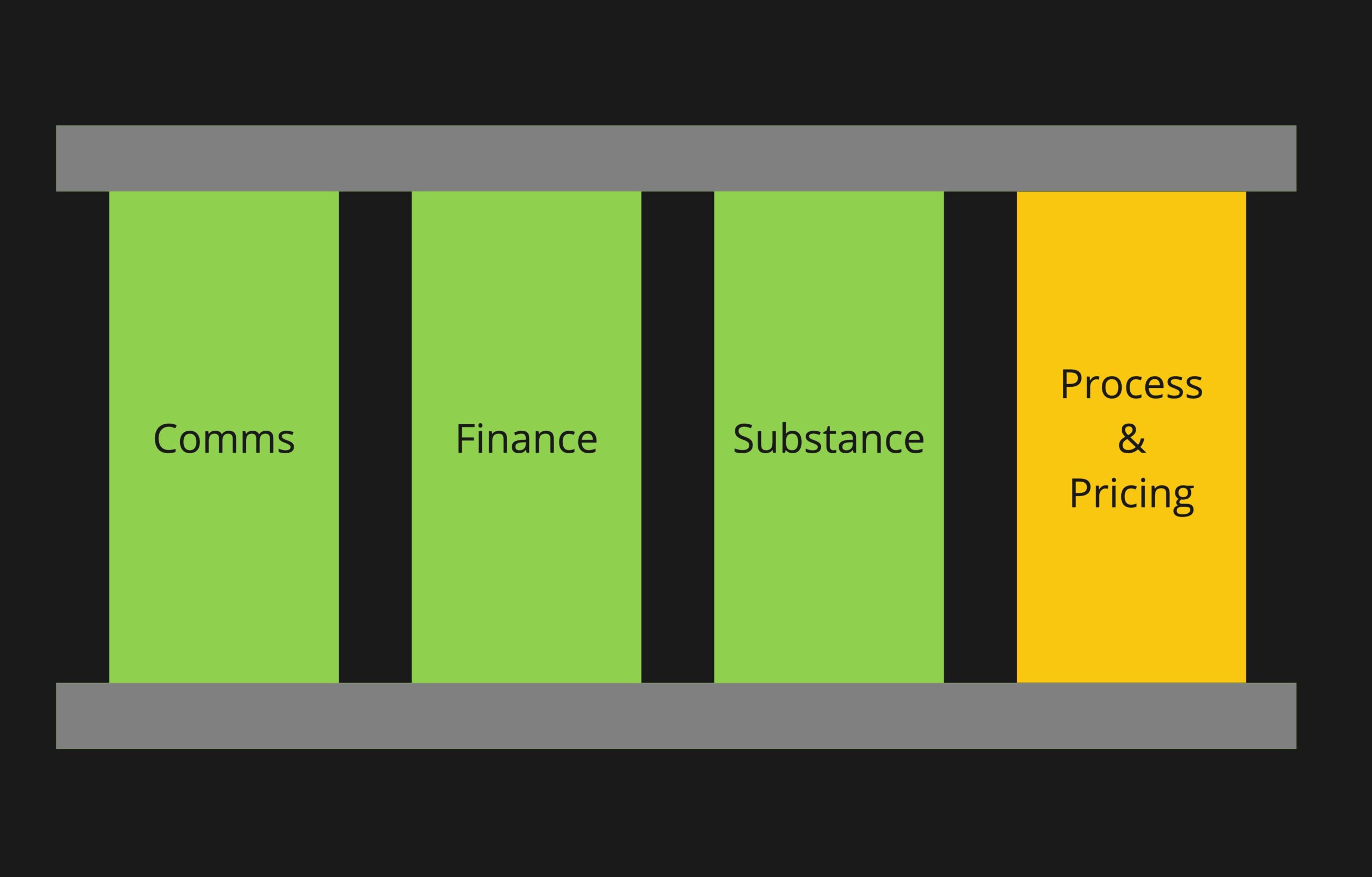Graeme Johnston / 10 July 2023
The argument of this article is that people doing legal work typically utilise three highly-developed technology pillars but that a fourth needs more attention if real progress is to be made with the crucial challenges of improving both quality and pricing.
I freely admit that this is not quite the orthodox way of thinking about the topic, but it’s one that I suggest gives a helpful perspective.
The first three pillars
1. Communications. Lawyers typically use general purpose business technology for this, such as audio (since the late 19th century), email (since the late 20th century) and video calls (much more so since covid). Many also now use some form of messaging to do their work, either outside the control of the organisation (e.g. Whatsapp) or within it (e.g. Microsoft Teams). Hardly anyone suggests that law-specific technology is required for any of that.
2. Finance. Some people use general purpose (not law-specific) finance systems to control handle the cost of legal work, such as SAP (for large companies) or Xero (for smaller ones). However, there are specialist ones targeted on the particular needs of a time-based business model, whether for large legal service-providers (e.g. Elite, Aderant), small providers (e.g. Clio) or legal departments purchasing lots of legal work (‘ebilling’ systems – the name betrays the 1990s origin, though the current generation uses NLP – ideally integrated with the organisation’s main finance system).
3. Substance. In law, this mostly means documents. Lots of documents. The substance of legal work is mostly stored in a document system – whether a general purpose one (e.g. Microsoft or Google) or a specialist one offering some additional things valued by lawyers (e.g. iManage or NetDocuments). On top of that there is a whole world of specialist document-handling software for lawyers. This is the world of ‘legal tech’. Big categories include legal research, document assembly / automation / drafting assistance, document review / ediscovery and contract lifecycle management (CLM). There are a huge number of products and niches.
The fourth pillar
4. Process and pricing. I think of those two Ps together as a single pillar because, unless you’re on top of process then it’s going to be impossible to get on top of pricing as a law firm unless either (1) your clients have such economic dependence on you that your charges aren’t really of concern to them or (2) the realistic competition you face isn’t very good at these things either, and isn’t likely to get much better within a timescale of relevance to you.
Now, there has certainly been some progress on process over the years.
- For routine, repeatable work there have been rule-based systems for decades now. The modern ones emphasise ease of reprogramming. Human-in-the-loop automation, for better or worse.
- For work that involves huge volumes of data, there are established procedures for managing and quality-assessing it, typically using one of the ediscovery systems mentioned earlier.
But for the kind of legal work which merely ‘rhymes with’ – rather than closely repeating – earlier matters, the overall state of progress is considered by many people close to the topic to be rather, well, disappointing
After all these years, just why does something fairly commonplace – litigation or M&A or investigation or a financing – still cost quite so much? And does it need to be quite so hard to see what’s going on, even in genuinely complex work?
Certainly, things ‘come up’ which aren’t entirely predictable, but that shouldn’t be an excuse for failing to take process more seriously, recognising that, even in situations that are – or appear to be, at the coalface – quite VUCA, it can help to communicate about process in legal matters in a more structured way.
There are two basic reasons why it’s worth taking this seriously.
- Better quality communication about how things stand during the life of a matter makes it manageable. This is so that you can see reality, consider options and adjust course appropriately and quickly, without having to spend a huge effort in figuring out what’s actually going on. At the moment, the obstacles in the way of that involve accepting either (i) considerable ignorance of the reality or (ii) a greatly-delayed understanding of it or (iii) a significant additional overhead of working it out with heavy manual effort.
- Better ability to compare matters and draw real, objective lessons makes it possible to improve. Issues such as how long things last. How much they cost. Where the risks of overrun are. At a level of detail where you can really see what happened. And consequently, figure out how to price more predictably, and what assumptions or exceptions to bake in. And, by doing so, work out how to improve service, quality, pricing and profitability.
Juralio: building a stronger fourth pillar
To date, we’ve been highly focused at Juralio on addressing the challenges of process, by building software that allows you to get it just so for legal work. We help you to do that in an easy-to-learn, highly usable way, striking those difficult, crucial balances: structure and fluidity; simplicity and expressivity; templating and freedom; ease of learning and sophistication. Without creating the sort of pushy, irritating, mechanical experience that lawyers typically hate. Empowering, not stifling.
The requirements of legal work, and the people who do that work, are – in our view – significantly different than those of the engineering domains from which the major project management / work collaboration tools (e.g. MS Project, Jira, Asana) have emerged.
But we’re now just about where we want to be on process, so our focus has now – at last! – moved to adding that numerical layer on top. Pricing and all that underlies it.
In our view, unless you build pricing on a solid foundation of process-reality, you’re likely to end up with just another spreadsheet on the garbage heap of history (or the GIGO sub-heap of work-history).
And there’s only so much you can do to address this problem with time recording / natural language processing, because the key thing is to help the people doing the work to get their heads around the process. Capturing the words describing what they’re actually doing isn’t enough, even in theory. Why we’re doing this, what’s to be done, what’s being done, what else could be done, how it can be improved, what the impact would be of not doing it. Those sorts of thing are the key questions.
Also, once you have better ‘data in’ — a more reliable representation of what’s being done, how long it’s taking, how much it’s costing — just think about all the interesting applied statistics / data science you can do with it.
Just saying ‘no’
One other thing to mention is that we’re saying ‘no’ to requests to build things that exist already in adequate form within the other three pillars. Instead, our approach is to integrate. So:
- We’re not adding document management / collaboration functionality. We already offer ways to interact with Google Workspace and Microsoft 365 as standard – just ‘flip a switch’ to turn that on. And we can integrate with other document systems as well.
- Likewise, we’re not building a messaging function. We already integrate with Microsoft Teams.
- And we certainly won’t be building a full finance system. Instead, our strategy is to allow customers to
- feed time recording data from Juralio into their existing finance system (much more convenient for the user, as the codes/narratives can be prefilled in draft based on the activity you’re engaged on in Juralio; also much better quality data)
- map actual costs data from the finance system against project reality and cost projections in Juralio.
Our costs functionality will be launching later this year. If you want to find out more at this stage, please drop me a line via this website or LinkedIn messaging.
You can also sign up for a free 14 day trial of Juralio on the website at any time.

